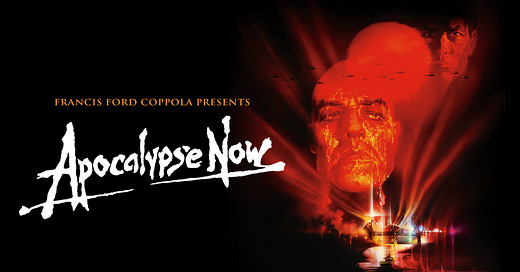Francis Ford Coppola's great big bowl of pasta dough
"The way I write is like I have a great big bowl of dough, pasta. And I'm writing and, you know, once in a while I take some and I make a pizza, or I make a cake, or I make something."
I've been deeply in love with films from the moment I first stared into the flickering lights of the TV and got caught up in duels, embraces, kidnappings, dances, battles, and riding off into the sunset with the Duke. Both as a fanboy and as a professional screenwriter, I’ve also always loved peeking behind the curtain and discover how the magic was made.
One such look behind the curtain comes courtesy of none other than Francis Ford Coppola. Some of his movies will always be within the top films of all times. In a clip, he explained his creative process. I love the idea of the "great big bowl of dough."
Being a writer, I love watching things as much as I love reading them. I love words. And, after watching the FFC clip, I thought I'd actually want to preserve Coppola' take on the creative process in a written post. If you want to watch it, just scroll to the end. And for those who’d like to read instead, here are the words of Coppola-Meister:
"I'm most interested in the writing part, because that's the - ... I feel very confident that I can do production, I can make the film look good, I can have beautiful photography. Even if I can't afford big stars or actors, I can find new actors. I feel very comfortable and confident about that. Where I'm the least confident, the most insecure, is the writing because this is what I always considered - as a young person - I wanted to be a writer.
I have been writing ever since I was nineteen, eighteen years old and always felt, oh, I have no talent as a writer, I wish I could have talent. I think writing is one of those areas, acting is another, where, if you're not very good at it, if you try and work and you try and you write and you write and you write, or you act and you act, you can actually get better.
The way I write is like I have a great big bowl of dough, pasta. And I'm writing and, you know, once in a while I take some and I make a pizza, or I make a cake, or I make something. But it's all the pasta of my life, all the ideas I have. Something I saw, or a dream, or an observation. And the important thing is that it doesn't have to be a whole developed idea. It just has to be like a seed. And then, when I'm ready, I will just work on it every day, maybe in the morning because the morning is a time when you're very rested.
And then when I have, you know, whatever it is, maybe sixty seventy pages, then I'll read it. Then what I like to do now, I like to take it and write it as a short story. And the reason I like to write it as a short story is because I look at it from another way. And in a short story you're able to say things that you can't say in a screenplay. And very often, I just - one thing I've learned - write the ending. Cause the ending is obviously very important and is where everything has to go. Otherwise, if you don't just write the ending, then you're gonna be saying "Oh, I don't have an ending."
Very often I leave it as a short story and I even show it to my colleagues as a short story. And then we go and we look and we talk about the actors or we go look for locations, whatever. But we only have the short story. And we find locations - and sometimes the locations are very unusual and you say, wow, we could really use that. And you know that notes are important. And then, when we're starting to get closer, then it's time to write the screenplay. So in the screenplay I can incorporate some things about the actors we thought about, or the locations - at any rate - now is the first time that I translate it all into a screenplay. That's more or less my process."




